
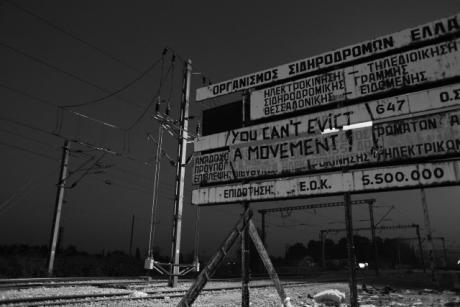
An inside look at one of the most remarkable stories to come out of Greece's ongoing economic and refugee crisis - the intersection of the anarchist and migrant solidarity movements in Athens.
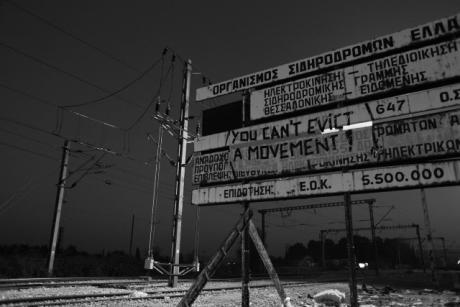
 Photo credit: Zaid Thanoon. Some rights reserved.
Photo credit: Zaid Thanoon. Some rights reserved.
As the Troika’s third memorandum for a Greek bailout was being calculated to render the ‘historic’ OXI vote of just weeks before (July 5 2015) effectively meaningless, hundreds of Afghan refugees were arriving in Pedion Areos Park in the centre of Athens.
What was to be done to support these people with no access to shelter, food, water, healthcare? Tsipras had come to power on a pro-migration, anti-austerity wave. His government did not respond. They were busy selling their mandate to the Brussels technocrats, at gunpoint bien entendu.
‘A humanitarian crisis is unfolding in the Pedion Areos park. The indifference of the authorities is a crime,’ reads the opening statement by the ‘Solidarity Initiative for Refugees’, a name taken by those who were the first to organize a response. Initially, this impromptu alliance of leftists - variously on the anarchist/communist spectrum - provided water, when it became apparent that the scale of the issue demanded an assembly to gather support.
Very quickly, a system of distribution was established in the park, including food, water, clothing, a clinic. This was an organic response to a situation with complex causes but a very basic – immediate – manifestation: there were hundreds of people with no money and no legal rights in a boiling hot park. The state’s refusal to engage the situation necessitated a self-organized response.
This story of Pedion Areos and the actions towards its resolution contain in microcosm a solidarity movement that has been developing in, around, but primarily against, official humanitarianism and its various torchbearers - from UNHCR to Frontex - since the summer of migration in 2015.
But the solidarity movement that has extended into breaking squats to house those migrants who are left paper-less and homeless in Athens is not simply predicated on state inactivity. It is, rather, organized on the assumption that whenever the state does act it will do so inefficiently, and with violence.
And as far as providing shelter for migrants in Greece is concerned, this has shown to be a devastatingly accurate analysis. In the final week of January alone, three people died in Moria Camp on Lesvos. The occupations, then, seek to provide a humane and political alternative to the now normalized brutality with which the west has responded to those making a claim on the (false) promises of human rights.
The majority of these squats are in the neighbourhood of Exarcheia, often labelled ‘the inaccessible’ by those who look down on it. Certainly, the state and wider society use their non-presence in this somewhat autonomous zone to posit its degradation. The state symbolically man its perimeter: you know you have left once you walk past a cadre of riot police twiddling their trigger fingers.
This standoff has a violent historical backdrop: Exarcheia has been the site of two important resistances that also stand as symbols of state violence. In 1973, the Polytehnio University, which marks the western side of the neighbourhood, was occupied by students in opposition to the military junta. On November 17, the junta responded by driving a tank through the campus gate. 24 civilians were killed over the course of the uprising.
And in 2008, the murder of 15-year-old Alexandros Grigoropoulos by special forces in Exarcheia catalyzed an insurrection that spread throughout the country. Exarcheia is the symbolic centre of Greek resistance. In many ways, it is also its practical centre. It is a space to organize, a space for squats and cooperatives whose operations continue to repel the state and are facilitated by the latter’s absence.
Thus, in part, can the squats that shelter migrants remain open. A certain autonomy has already been earned through years of struggle. A network of people and resources also exist as a function of this autonomy, making the initial opening of squats both necessary and possible as a small scale response to the ‘crisis.’
There is no use, however, conjuring some grand confrontation between these particular autonomous practices and the entire state. These actions are just one local iteration of the struggles against a ‘crisis’ whose reach is, nevertheless, global. And indeed, another reason why the state does not immediately shut these spaces down is because they do some work that it won’t: they keep a few thousand people off the street, and give a focus to parts of the anarchist movement that might otherwise be directed more confrontationally towards the state.
But there is no parallel between state-sanctioned humanitarianism – with its complicity and its military – and this movement merely because they both, in competing ways, might seek to provide shelter. These squats do not even pretend to provide a solution to the state’s mess, but they do contain various demands.
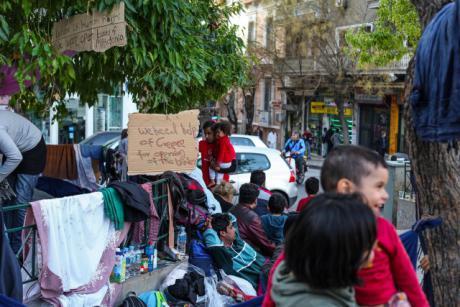
 A makeshift migrant camp in central Athens. Photo credit: Zaid Thanoon. Some rights reserved.
A makeshift migrant camp in central Athens. Photo credit: Zaid Thanoon. Some rights reserved.
The Greek word for a squat is Katalipsis, parsed as ‘against-receiving’ (Kata-Lamvano). As such it implies the local act of taking control of one’s circumstances, and also the refusal to accept what little might be offered. In this form, squats embody a fluid variety of anarchist principles.
They seek a collective autonomy from structures of domination – structures of which the state, from this perspective, is metonymic – based on an egalitarian diversity of individual needs and desires. Horizontal and anti-hierarchical processes are the foundations upon and through which each can give their opinion to the space, and thereby confront a reproduction of authority in which the privileged speak or act on behalf of those they subordinate.
Process is central also because anarchists often see the state as the dynamic totality, or culmination, of particular relations of domination between people, and so something that can be easily reproduced – or better, confronted – even in our most local interactions.
From this perspective, a level of practical autonomy (objectively figured as ‘illegal’) is a strategic standpoint from which the state can be confronted. As such, these squats – at least those called ‘political squats’ by the Greek community – are neither escapist nor even utopian, but provide platforms for political struggle.
The articulation of this struggle in the specific case of the squats broken for and with migrants is, however, complex and often contradictory. Most of them should be seen as a practical extension of the actions in Pedion Areos rather than as an a priori instantiation of anarchist principles.
And yet within these spaces the practical necessity for migrants to find shelter and legal status - even as some have an ideological commitment already established - lives in tandem with a distinctly anarchist practice. Vis-a-vis the law, for example, this manifests as an autonomy which is both re-appropriative and prefigurative. Safe passages for migrants – whether across seas, through legal processes, into the labour or housing market – are continually blocked, thereby creating a ‘crisis’ of precarious and illegal movement.
As states produce illegal migrants, migrants are always in a sense reappropriating that contingent version of the law – by the sheer act of staying alive and mobile – whilst also making a visible claim on its pretences. At the same time, a political squat is always a space of prefiguration, as it struggles for an autonomy that prefigures a world in which the state plays no part.
As such, in these squats one finds the coexistence of those who are consciously rejecting the state and ones who have been rejected by the state and broadly seek to contest that rejection in demanding recognition through asylum, reunion with their family, and a job.
This duality is, however, not always stable at the particular level. Both the migrant communities who live in these squats and the ‘solidarians’ who either live or help organize there are of course motivated by varied experiences. The solidarity people are on a spectrum between benevolents and insurrectionaries, while the migrants are unified primarily by circumstance, and in fact make up a massively heterogeneous group of people of diverse cultures, races, and classes.
Broadly, then, these spaces are made up of multiple elements with at times divergent demands, in a practical action that is not so much nameable in advance as it is complicating theoretical frontiers. As is seen if we look closer at the how self-organization operates in this context.
Self-organization has been at the kernel of anarchist politics since its inception. As Enrico Malatesta - an early Italian anarchist - saw it, a degree of organization is constitutive of human life, since a ‘human being in isolation cannot even live the life of a beast.’ As such, the dynamics of this organization were a barometer of our political condition.
And authority, for him, was the principle of organizing others, ordinarily those who made up the ruling class organizing the exploitation of the labour of others for their personal advantage. Self-organization, then, becomes the weapon with which to confront this dynamic of (mis-)representation. And this notion that representative politics will always misrepresent - or actively deny - the needs of those it represents runs throughout the anarchist tradition, so that one definition of autonomous self-organization is ‘precisely the rejection of all representation.’
While self-organization is conceived primarily as a necessity, which it often is and certainly is in this context, it is also clear how self-organizing in a squat is founded upon an equal presence of various privileges which are denied most migrants, whose priorities are predominantly elsewhere.
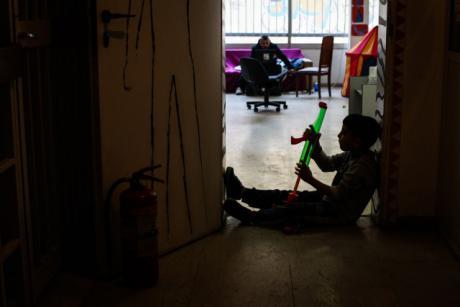
 A boy plays in a refugee squat in Athens. Credit: Zaid Thanoon. Some rights reserved.
A boy plays in a refugee squat in Athens. Credit: Zaid Thanoon. Some rights reserved.
It is time-consuming and tiring work, as anyone who has tried will attest, based not only on the commitment to achieve a certain end, but to achieve that end in a certain way. Which is not to say that there is one way but rather a plurality of important voices to be acknowledged.
Yet the ability and the will to participate already depends upon a concept of the future in which that participation will mean something. And the truth is that only those solidarians who are in these spaces out of choice have a vision of that future. For most migrants, the prevailing condition is one of precarious uncertainty, unclear as to if and when the Balkan route might open, or when their asylum claims might successfully spell some change. Anyone might leave at any moment; everyone is in a transit that risks becoming permanent.
At the time of the self-organized response in Pedion Areos park, the transitory nature of the situation was apparent to all, and many migrants were moving through Athens in a matter of days, so that a relation of provision was more legitimate even according to far left principles.
Similarly, at the opening assembly of the first squat opened for migrants in Athens, there was an assumption that this might last a few months, perhaps until Christmas. That was in September 2015, and a hundred people still live in that squat.
Over the course of this period, it appears that the prevailing dynamic within those squats that solidarians and migrants live and organize in (there are some with only the latter) has been a perpetuation of a dynamic of provision, materially and symbolically.
Residents – a favoured term within the squats for the migrants who live there – will tend to cook and clean on rotas, they will help out around the building, they will teach languages if they can, and, generally, form the backbone of the community. Yet ‘solidarians’ still have the keys, still dominate the assembly, still assume - however inadvertently - a de facto authority.
Perhaps it is understandable that those who come to the space in order to participate, help, organize – people describe themselves differently – will be more willing to assume responsibility. A friend from Syria, having survived the closed inertia of the camps, drew a line between freedom and responsibility.
He did not want to have to take on too much work within the building, but enjoyed the squats as a space to engage with people and a space from which he could have the freedom to leave. This is more than understandable, he has left his two teenage daughters in Damascus and needs to find stable work before he can bring them over, which is responsibility enough.
The traumas attendant on displacement from home and family no doubt render self-organizing within a building full of people, and the notion of the whole space that this entails, difficult. This is not to mention the huge cultural and racial disparities between the residents themselves, compared that is with the relatively homogeneous class-cultural makeup of the solidarity people.
An Iranian resident in his twenties felt that the retreat of residents into their individual needs and spaces resulted in what he called an ‘illegal camp.’ I think what he meant was that the politics of the space were not always clear to those living there, that they weren’t engaged enough as political agents, so that its being a ‘squat’ meant only an objective relationship to the law, rather than a lived dynamic.
Yet bringing about a political participation by all within the building is not a simple process. Some, like this man, have political backgrounds and so relate to the space in a certain way; others don’t, and have different inclinations. People have tried to hand over the keys of the storage or the larder to the residents, but will repeat that it simply didn’t work.
With limited resources an equal distribution is essential so that everyone can eat. But handing over the keys to the residents has ordinarily led to some taking more, some having nothing. This is unsurprising. When you do not know from where, how, and thereby if the next store of food will arrive – in short, when you don’t feel an ownership over something that you are wholly dependent on – you will take what you can.
Yet it needn’t be a choice between solidarity structures and chaos: perhaps if residents were slowly involved in rotas of distribution and collection which are currently reserved for solidarity people, then a sense of collective ownership would emerge. These are important questions precisely because of the difficulties they present in practice, because those issues that stand in the way – of race, trauma, dependence – are potentially the very issues which could be worked through by these practices.
The weekly assembly symbolizes these tensions. In theory, the assembly is an opportunity for issues and ideas to be shared and/or encouraged. Anything that concerns the building should first reach consensus in the assembly before it is done. But in a context where the majority of the ‘assembly’ does not live in the building, the process is reified, and so takes on a very different hue.
Meaning to be a space of consensual empowerment, the assembly ultimately disempowers those people it should solely concern. Many residents feel that it is all talk: it takes hours to get things through and still the plumbing hasn’t been fixed. Others will not even attend as they don’t sense that it concerns them at all.
The process is doubtless very difficult. The more people who attend, the larger the proliferation of translations - at a minimum Arabic, Farsi, Greek, English. At times people have particular issues with the behaviour of others within the building, and you might have a dynamic whereby the facilitator is mediating a confrontation between Farsi and Arabic speakers.
The real problem is that the (white) facilitator ends up being addressed as if they were the judge of the matter, as if it was up to them, which some may think it is, but it clearly isn’t. The assembly assumes a false authority. At times, people feel that the spectre of the assembly actually prevents quotidian issues from being resolved organically.
Ostensibly, the assembly is indicative of egalitarian and horizontal self-organization. In this context, it often actually stifles initiative, and ossifies inherent – and historical – power dynamics. These dynamics are already at play in who will attend, let alone speak at, the assembly, and are aggravated in process.
The assembly needs to proliferate to confront this, to reinhabit its role as a process that transcends the ‘assembly’ itself rather than be confined within its weekly schedule. Many residents might rather smaller working-groups (one suggested that each floor has its own micro-assembly) so that their voices can be heard.
People might prefer to write their thoughts and share them. There are many ways to go about this. Key to all of them is making sure we are always engaging one another in a way that doesn’t reanimate the grim hierarchies that constitute the forced dependency of camp ‘life.’
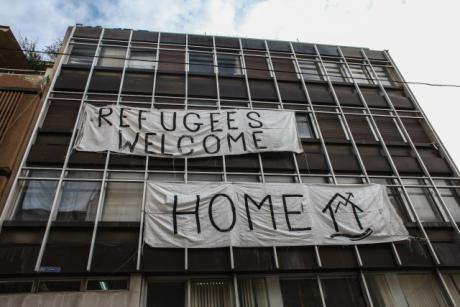
 Photo credit: Zaid Thanoon. Some rights reserved.
Photo credit: Zaid Thanoon. Some rights reserved.
The solidarity that is lived within these squats is, however, about much more than a line between volunteers and ‘victims.’ The relations that could spring up here are zero points of transformation. In the camps where you are ‘cornered off like a disease’ there is no platform for engagements between people that transcend the borders between them. These squats are affective and interactive in a way that goes beyond mere material.
And yet, materially, the squats are spaces that mediate between migrants and capital. It is a shelter with food and it is also a platform from which to raise awareness and get more food and shelter. It tends to be the mobility of those who have come in solidarity that keeps people coming, and thereby keeps people funding the projects, with money and time.
This inadvertent relation is a site for the confluence of various hierarchies of race, class, and privilege that play themselves out despite their political disavowal. While solidarity and mutual aid are founded upon a structural politics that seeks to disaffirm the status quo (even as it intervenes), dependent relationships that are more reminiscent of charity thrive here.
Many residents aren’t even made explicitly aware that the squat is something more than a place for provision. Since most people have spent some time in camps on the Greek islands before arriving in Athens, they are accustomed to a dependency that puts them at the mercy of those they depend on.
This cycle continues in the squats, where people are somewhat provided for by solidarity people, who thereby take on an authority which perpetuates that need. Of course at times it is essential to give people who are being routinely denied their right to exist what little they might need. And in another sense, the case is different, as it was put to me by a young resident: ‘do you think I could have made it all the way to Europe if I needed your help.’
But help is given, and must be. The point is perhaps that we must be something other than functional agents, ones who feel needed and thereby privileged. The camps of official humanitarianism are ones with very fixed parameters which reduce those who operate within them to functionaries of a static reality. These squats, contrastingly, are live, and are continually modified by the initiative of those within them.
There is no rule book to follow, but a series of people trying together to make something happen, to make something work. The space is always in the process of being created, and each day implicit violence is re-enacted as often as new equalities are performed. And it is the will to always try something again, or in a new way, that will keep the spaces from perpetuating those dynamics of aid and conservatism they seek to combat.
The solidarity here must then be infinitely malleable. There is no use in sticking rigidly to the principles of a Marxist, anarchist, or any other given practice. Here this often manifests as a macho arrogance that actually reinforces oppression even as it claims to know exactly what oppression means.
Perhaps the barometer of a radical anarchism may be its autonomy from the state. But for those migrants who are refused recognition by the state in the first place, their autonomy might mean something completely different. The basic paradox, which we must heed, is that right now the most important autonomy for most living in these squats is actually a kind of submission to the law (nomos) through the asylum that will grant them the freedom to earn some money for themselves and begin their lives anew.
That is to say, the central way this solidarity movement distances itself from humanitarianism is in the will to grant autonomy to those it supports. But if that autonomy is falsely assumed to be the same for those who have no papers as it is for those who do then principle will intervene with effective practice. But as long as a malleable solidarity confronts the contradictions of this ‘crisis’ with new configurations then we can begin the empowering transitions out of it.
Right now, in Athens, the question of how these squats which were originally meant to be temporary will settle into a new permanence is an important one. One of the benefits of occupying buildings in the city is that people can interact with them and leave them, forming friendships and fundamentally changing the makeup of an area.
Perhaps those contradictions that obtain when a squat is initially broken and self-organized for others are not resolvable, and it will only be when migrants open squats themselves that the dynamics of dependence will be totally broken.
Or perhaps we should merely valorise the tension rather than stress the contradiction, and hold fast to the belief that in the attempt to continue to create something new together – and in the avoidance of old habits – we are already battling against colonial histories and their humanitarian ghosts.
Hector Uniacke lives, works, and writes in London, and has been organizing in squats in Athens intermittently over the last year. He has also written on the topic of migration for Novara Media.
refugees welcome